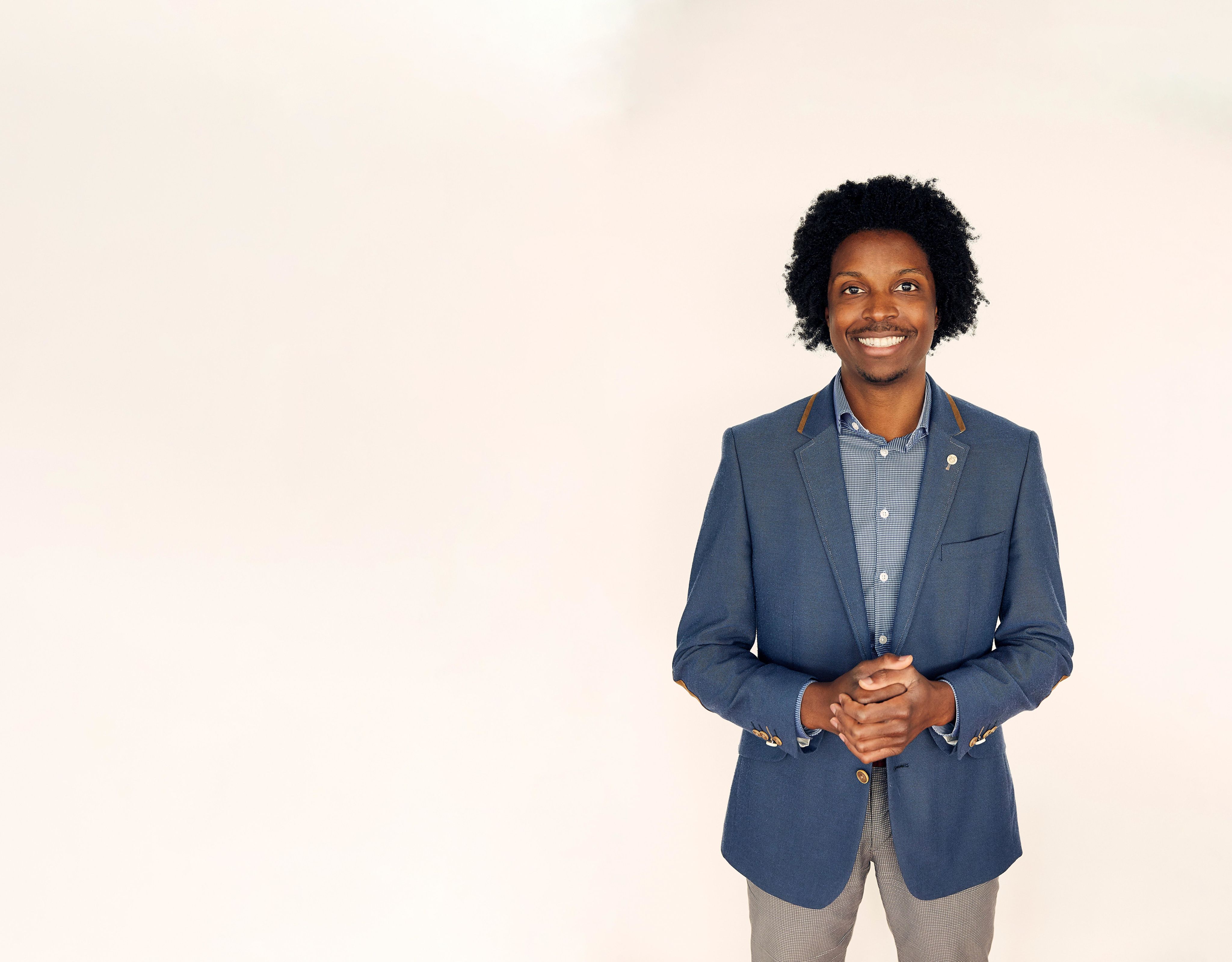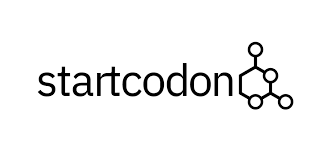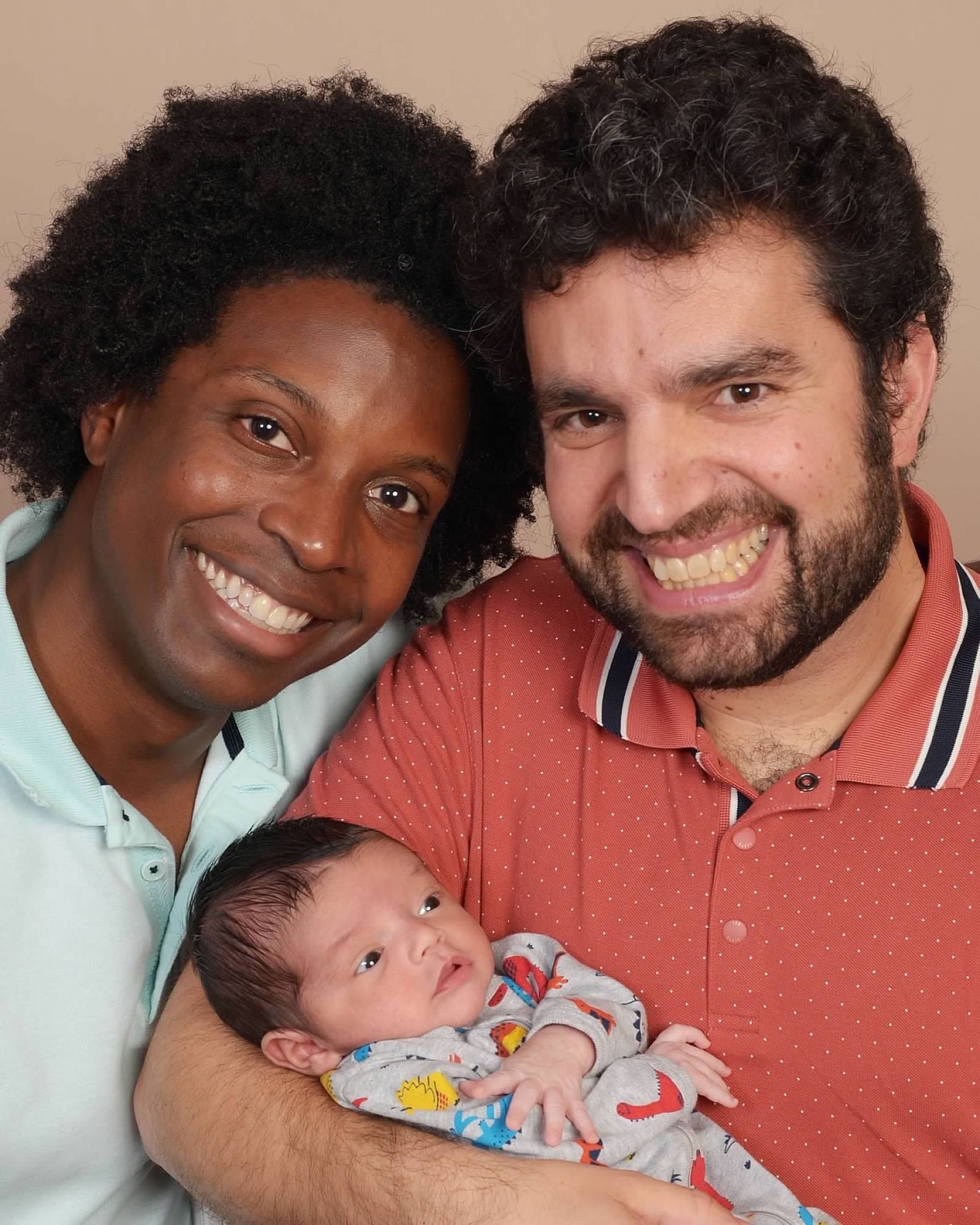An interview with
Jason Mellad

Dr Jason Mellad (2004) is the CEO and founder of Start Codon, a healthcare accelerator that supports innovative startups with funding, facilities and extensive coaching. He gained his PhD from Clare in 2009 and now lives in Cambridge with his husband and young son.
Here, he discusses the most promising areas of innovation in healthcare, what makes Cambridge the ideal environment to seek out outstanding startups and how his experiences as a Black gay man in the biotechnology industry have shaped him.
Could tell me about how you first came to found Start Codon?
Previously, I was CEO of Cambridge Epigenetix, a spinout company from the University of Cambridge that was co-founded by Professor Sir Shankar Balasubramanian and his good friend, Dr Bobby Yerramilli-Rao. Shankar is renowned in the genomic space as the co-inventor of Solexa sequencing, a technology that is now driving a revolution in the field. I leapt at the opportunity to join the company as employee number three in 2013, many moons ago, and to help build it up from scratch. Eventually, I was promoted to CEO. Throughout that process of fundraising and selling, pivoting the company and building teams, I developed a passion for business development and getting things off the ground.
I was later approached by several stewards of the Cambridge life sciences ecosystem, and they all had an idea of co-founding a world-class venture builder and accelerator programme that would help academics and young companies to get up and running and secure financing, and really give them the guidance and support they need to be successful. And that was the genesis of Start Codon. I was introduced to my co-founder, Dan Rooke, early on, and we hit it off immediately. We felt that our skills matched each other well, and the rest is history. We raised financing, and now my full-time job is helping other companies and hopefully finding the next Cambridge Epigenetix, the next Solexa, the next big thing.

What innovations in healthcare are you most excited about?
Oh, there are so many, almost too many to count. I’m definitely excited about epigenetics and 3D chromatin architecture. We work with startups in this space whose technologies can derive even more information from our genomes than we ever thought possible. People are just now getting their heads wrapped around genetics – many of us are familiar with 23andMe and Ancestry.com, and how we can use these tools not only to look at our heritage but also to help predict disease risk and stratify us for better therapies. However, not many people yet know that there are additional layers of information hidden in our genomes that provide even greater insights into how we operate and how we can stay healthy and not succumb to disease in the first place.
I think that there's a lot to be said for immunology as well. Our immune system has such a profound impact on our health. It’s tied to wellness and stress – even things that we take for granted, like getting a good night's sleep, can have an impact on our immune system. I'm really fascinated by companies in that space.
The third area I'm excited about is neurology. I don't have a neurology background from my days as a researcher, but I've always been fascinated by just how complex the central nervous system is in our brain and how it coordinates our body’s various functions. Many groups have tried to map out that complexity, but we still don't quite understand it. I'm just intrigued by the fact that, even as we start to explore artificial intelligence and machine learning – I think those are amazing tools that are revolutionising all fields – there's something about the human brain that's so fascinating. There's so much more to discover.
What challenges have you faced as a leader during the COVID-19 pandemic? How has it affected the way that Start Codon has been operating, and have you taken any lessons away from this time?
We are really a special case because we raised our financing to begin investing in other companies right at the start of the pandemic. We had just moved into our brand new offices at the Milner Therapeutics Institute, we had welcomed our first four investments and were all settling into the office together, getting ready to have a traditional accelerator experience; then, three weeks after we started, the pandemic hit and we were locked down. So we have been virtual from nearly day one. We're now over a year and a half into our programme and we’ve only had three weeks where we were all physically in the same room. That forced us to change and adapt quite quickly.
Previously, our programme would require companies to move to Cambridge to participate. Now, since we've been virtual, we've been able to spread our reach to so many different corners of the UK, and even the world. We have companies coming from Birmingham, from Singapore, and founders from across the world who want to come through our programme and be invested with us. Many will ultimately make their home in Cambridge, but for now it gives us far more flexibility and reach. We've definitely had to adapt how we support our companies, which has been a challenge across the board. In the life sciences industry, there's been a lot more investment, but early-stage companies still have that struggle of getting off the ground.
We've had to figure out how we can connect these businesses to our pharma partners, to our mentors, and also provide weekly support ourselves in the most effective way when we couldn't physically see one another, face to face.
Finally, I'd say one of the strangest things has been making investments in companies and founders who we haven't been able to meet in person. That was something we never anticipated. Typically, that human face-to-face interaction is so important. Having to do that over video, but still wanting to deploy capital, meant that we had to trust our gut instinct. We have now met the founders we invested in since restrictions have loosened, and I'm glad to say that we made the right decisions. It was a very strange thing to invest over Zoom!
Despite the challenges, it has been great to be challenged in that way. To have something beyond our control disrupt our preconceptions of how the business would work actually helped us engage further with the companies in our programme. The teams we work with are disruptive businesses in their industries and we were simultaneously being disrupted ourselves. It's all about innovation on multiple facets. Actually, we'd like to describe ourselves as a startup helping other startups.
Why do you think Cambridge is the right setting for an accelerator like Start Codon?
It comes down to having the perfect mix, in my opinion, of talent, technology and finance. Bring those three things together and it creates the ideal environment for a company to flourish. Talent and teams are such vital components of business, even before you get to technologies, and you can't beat Cambridge for a pool of incredibly talented, enthusiastic and experienced people in a space that is relatively small, but large enough to be diverse. Plus, we have a very rapidly expanding life sciences ecosystem here that is cross-fertilising other fields such as the tech industry. We've got the likes of Amazon, Arm, Apple and Google – everybody is really coalescing into this one very concentrated community.
Plus, it helps to be in an environment where people are willing, eager and encouraged to support one another, to be mentors and open doors.
In Cambridge, we have this ethos that we're all in this together. We're a very tight-knit group, and we welcome newcomers, and that's so important and rare.
Take us back to your time at Clare – why was the College important to you?
When I first came to the UK, I had never owned a passport before and I had barely left my home state, let alone the United States. So it was quite a culture shock to come all the way overseas in the middle of a very chilly October from Louisiana, where winters are not like they are here! But when I arrived at College, everyone was so welcoming, which made that transition so much easier for me. I can never thank them enough. I think that had I just done it completely on my own, it would have been a real struggle, but being part of the College meant I was able to have a relatively soft landing. There was always a friendly face to turn to for help with shopping, or to tell me what a duvet is! It was invaluable to have the College there.
You recently took part in a discussion with Elizabeth Sandler as part of the Pride at Cambridge campaign. Could you tell us more about that project and why you wanted to get involved?
That conversation came about from a desire, not only from Elizabeth and me, but from the University itself, to highlight how EDI – equality, diversity and inclusion – is so important to them and is a guiding ethos that Cambridge is going to be building on going forward. It was a real honour for me to be a part of their initiative.
It's important for me as well, because I live every day as a proud Black gay man, as the child of immigrants, as an immigrant myself, and it's unfortunate that you don't see many people like me in my industry. So I take any opportunity I get to highlight how spaces in Cambridge and beyond should be, and are becoming, open to people from a variety of different backgrounds. I wouldn't be where I am today if it weren't for people who were there supporting me, and I'm always looking to pay it forward.
What has changed for you as a queer identifying person since you first came out as a student at Cambridge?
I actually met my partner Vasilis, the love of my life, in London in 2008, and we moved back to Cambridge because I wanted to work in this ecosystem again. We got married after marriage equality was passed in 2014, and we now have a beautiful son who turned two in October. He is such a handful, and he's the best thing in our lives. We applied for and were awarded a parental order earlier this year. The fact that we can be parents, and the laws allow us to do that, is one of so many things that, when I was younger, I never dreamed would be possible.

In particular I find that living in the UK and especially in Cambridge, people are not just tolerant, but so accepting and embracing of us. It's incredible. I'd like to think that, though it can feel like something of a bubble, it's expanding rapidly. Now, in both our work lives and our personal lives, we can be our true, full selves, fully happy and surrounded by people who are supportive and love us.
What makes you hopeful for the future?
You mean despite the fact there's a shortage of milkshakes at McDonald's at the moment?! All jokes aside, what makes me hopeful for the future is the fact that I believe we are moving in the right direction. As a society, we don't always get it right the first time, or the second or even the third time, but I think the direction of travel that we're moving in is for the better. I see that there are more doors opening for women, for people of colour, people of different sexual orientations or socioeconomic backgrounds – you name it. Globally, access to education is improving, which will help to accelerate progress. However, we must all stay vigilant and continue to actively drive these positive changes to ensure we leave the world better off than when we found it.

